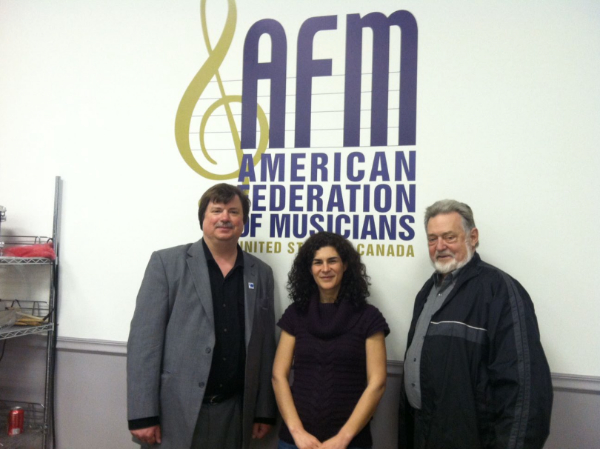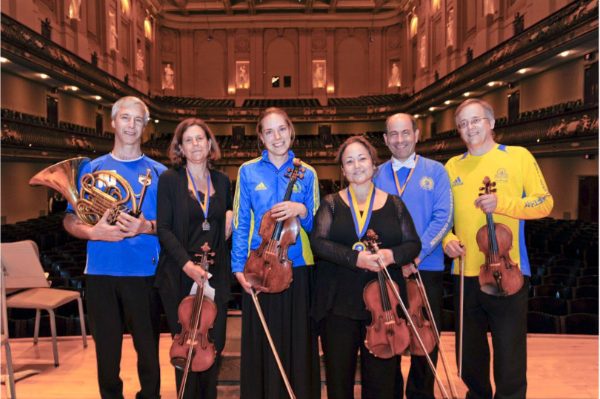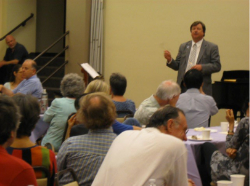At the beginning of April, musicians and management of the Jacksonville Symphony Orchestra reached agreement on a new two-year contract. The musicians’ negotiating committee supplied the details that follow.
After unilaterally declaring an impasse in September 2012, management imposed a 20% reduction in base salaries and reduced the season from 37 to 33 weeks. The musicians filed a bad faith bargaining unfair labor practice charge challenging the legality of that imposition. The National Labor Relations Board began investigating the charge. Harvey S. Mars’ timely posting on ICSOM’s Orchestra-L, noting that the facts of the charge resembled those of a case he had been involved in that was resolved in favor of the employees, eventually led to his volunteering to assist in preparing the Jacksonville case. After a thorough investigation that required many hours of evidentiary interviews of the negotiating committee, the NLRB agreed that the evidence justified prosecuting the case and issued a formal complaint against the JSA. The impending trial date, set for late spring, played an important role in the JSA’s agreeing to resume negotiations.
The negotiating committee is deeply indebted both to Harvey Mars for his involvement as well as for the Herculean efforts of Liza Hirsch Medina, whom the local secured to represent the musicians in negotiations that extended for months beyond her initial commitment. The new agreement splits the difference between the musicians’ previous contract and terms imposed by the Association, putting base salary at $35,700 and calling for a 35-week season. The terms of the new contract are retroactive to the beginning of the season and continue for one additional season. Just shy of one year’s worth of negotiations, upon contract ratification the local dropped its NLRB charge. The musicians are hopeful that a new era of collaboration has been launched now that their management has hired Henry Fogel for an extended consultancy “to provide guidance to the organization as a whole, at least for the duration of the Master Agreement through the establishment of its successor… [and] to help the JSA increase and improve both its revenue and fundraising capabilities and its overall fiscal management, as well as to explore thoroughly the organizational culture of the JSA in accordance with discussions of the parties during the first week of the consultancy,” which began in December.
On April 1, ICSOM Chair Bruce Ridge visited the Atlanta Symphony Orchestra (ASO) at the request of the Players’ Association (ASOPA). According to ICSOM treasurer and ASO delegate Michael Moore, it was a very busy time, starting with work that he and Bruce did with ICSOM videographer Tim Redman on edits for the 50th anniversary ICSOM Conference video. [Editor’s Note: The video documentary and trailer are now available on the ICSOM channel of Youtube (ICSOMOrchestras) as well as on the ICSOM website, www.icsom.org.] There were also dinner and breakfast meetings with the ASOPA committee to discuss all manner of issues, both common to the field and unique to the ASO. ASOPA’s brilliant PR expert, Randy Whatley, also joined the discussions. Bruce also met with the ASO CEO Stanley Romanstein and with ArtsATL journalist Mark Gresham (whose article about the visit can be found at www.artsatl.com/2013/04/qa-national-labor-chair-bruce-ridge-atlanta-visit-future-aso). Subsequently, Bruce met with the entire orchestra, inspiring all. Bruce left Atlanta to visit with the Alabama Symphony but returned to hear an ASO concert of new American music, including two premieres (one by a bass player in the orchestra, Michael Kurth). It was a very productive visit, and long overdue. Moore says that the ASO has taken several of Bruce’s suggestions to heart, including greeting patrons before concerts, and that he expects the visit to have a lasting impact. Musicians there are looking forward to Bruce’s next visit and hope that, in part thanks to him and ICSOM, the ASO will see a better future by that time.

ICSOM Chairperson Bruce Ridge meets with officers of the Atlanta Federa- tion of Musicians, Local 148-462. Pictured are (right to left) President John Head, Secretary Christina Caterino, and Bruce
According to delegate Emily Freudigman, the San Antonio Symphony has filled the position left vacant by the departure of former president and CEO Jack Fishman last fall. The SAS didn’t need to look far away to find Jack Downey, its new president and CEO. After retiring from the Air Force after a 26-year career, Downey has already developed a successful track record with San Antonio area non-profits. He first entered the nonprofit world in 1992 as the executive director of Christian Senior Services and then moved to the Children’s Shelter, where he grew the agency’s budget from $300,000 to $15 million. He departed as the shelter’s president and CEO in 2008 to join the Briscoe Western Art Museum as its executive director. The search to fill the position was conducted by a six-member committee consisting of four board members and two musicians.

Members of the Boston Symphony who participated in the Boston Marathon pose on stage at Symphony Hall, wearing their running uniforms to pay tribute to the victims of the horrific bombings at the Marathon finish line on April 15
Photo credit: © Stu Rosner, 2013. All rights reserved
ICSOM Chairperson Bruce Ridge went to Birmingham April 3 to visit with the Alabama Symphony Orchestra. Alabama delegate Kevin Kozak says that over three days Bruce met with the orchestra committee, local AFM leadership, management, and the musicians of the orchestra. He even found time to attend a morning rehearsal and the Coffee Concert that followed.
During a lunchtime meeting with the musicians, Bruce shared his experiences as ICSOM chair and gave a heartening and encouraging talk about the state of the industry and the importance of musicians’ shared endeavor. He gave some very good advice on “breaking the fourth wall” (the figurative wall between orchestra and audience). A lively question and answer session followed. Bruce was warmly received by the musicians, and his visit was much appreciated by all concerned.
After close to a year, the egregious lockout of the musicians of the Minnesota Orchestra continues—as does ICSOM’s Call to Action in support of the affected musicians. During the crisis musicians have continually demonstrated that we will stand together in unity through such hardship. Many orchestras have donated generously, and recently several orchestras have given historic amounts. The musicians of the San Francisco Symphony produced a benefit concert dedicated to musicians in both the Minnesota Orchestra and the Saint Paul Chamber Orchestra. The musicians of the Philadelphia Orchestra donated an entire concert fee, which is believed to be the largest gift ever given from the musicians of one orchestra to another. Musicians from the National Symphony and The Cleveland Orchestra have made very large monetary contributions. The musicians of the St. Louis Symphony donated the personal fees they earned from a concert they performed at the League of American Orchestra’s conference, which was held in St. Louis this year. Many other orchestras, too numerous to mention, have also made crucial donations to the cause. Information about the continuing ICSOM Call to Action to assist the locked-out musicians of the Minnesota Orchestra can be found on the ICSOM website.

ICSOM Chairperson Bruce Ridge meets with the musicians of the Baltimore Symphony at Meyerhoff Hall on June 12
Photo credit: Mary Plaine
Nashville Symphony announced a settlement with banks that eliminates all of its obligations to commercial lenders and saves Schermerhorn Symphony Center (owned by and home to the Nashville Symphony) from the auction block. Of the $123.5 million raised to build Schermerhorn Symphony Center, $102 million was financed with variable rate revenue bonds. Those bonds were guaranteed by a letter of credit from a group of banks fronted by Bank of America, issued in 2004. Since then, Nashville Symphony’s endowment has sustained significant losses—not only from the market crash of 2008 but also from the 2010 flood, which forced the orchestra out of their hall for eight months.
For the past two seasons the Nashville Symphony Association (NSA) has worked with consultants to identify additional income streams, but on March 15, 2013, it informed the bank group that the letter of credit would not be renewed. The banks paid full value to bondholders, and negotiations continued over the orchestra’s obligations. In June, Bank of America announced it would foreclose on the hall and put it up for auction on June 28. The settlement, reached days before that deadline, provides for a lump-sum payment to the banks, which will then write off their losses on the rest. While this has reduced NSA’s debt-service payments, the restructuring includes a $20 million loan agreement with a realty company owned by Martha Ingram, Nashville’s greatest arts patron and friend of the Nashville Symphony.
NSA has appointed one of its former consultants, a forensic accountant, to serve as interim coo. Cost cutting measures have been announced since his arrival, including plans to accept bids for running the hall’s restaurant, café, and catering, and the laying off of staff, including nearly 20 catering and food employees and the NSO’s long-time personnel manager. It is in this environment that the musicians of the Nashville Symphony are negotiating their contract, which expires on July 31.





